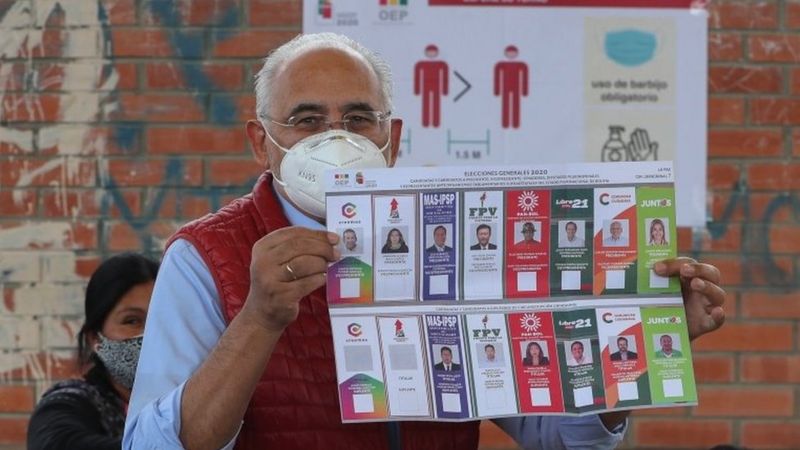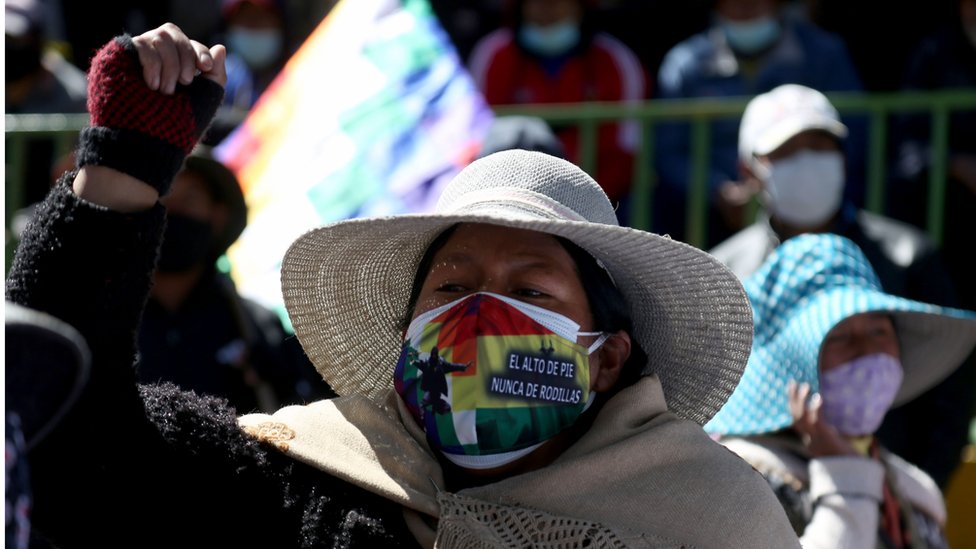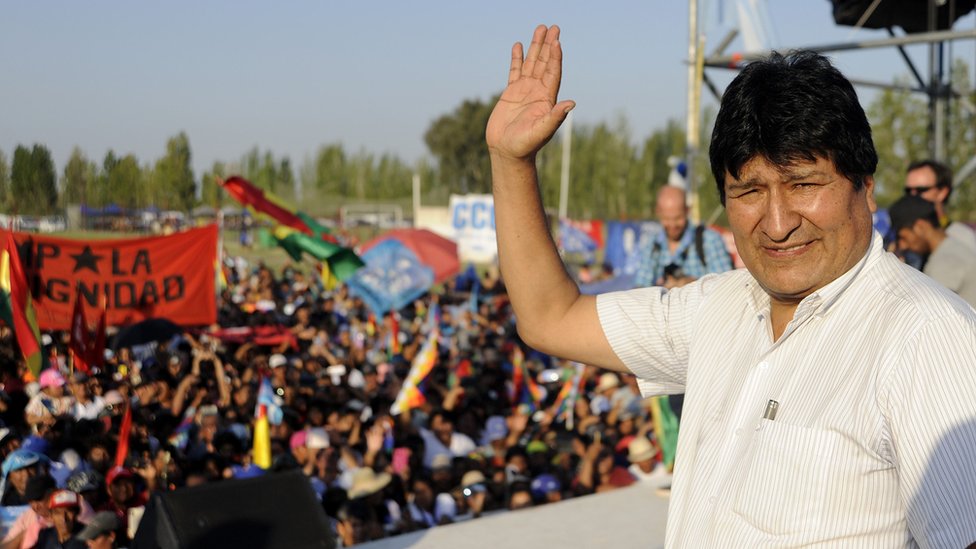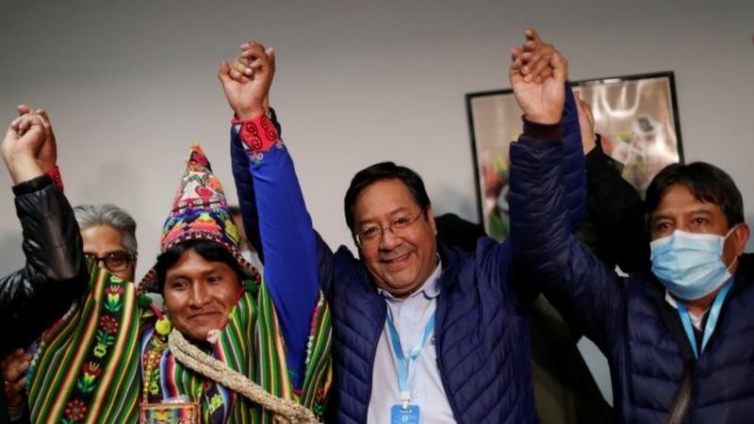A quick count suggests socialist candidate Luis Arce of the Mas party is set to win Bolivia's presidential election in the first round. The second-placed candidate, Carlos Mesa, has conceded defeat and called Mr Arce's 20-percentage-point lead in the quick-count "unassailable".
Mr Arce, an ally of exiled former President Evo Morales, says he will form a "government of national unity". The country is still deeply divided after last year's annulled election.
What does the quick count say?
A quick-count by pollsters Ciesmori suggests Luis Arce has won with 52.4%, trailed by Mr Mesa of the centrist Citizens' Community alliance with 31.5%.

Exit polls carried out by the Jubileo research institution also give Mr Arce a commanding lead with 53% of the votes, followed by Mr Mesa with 30.8%.
Twice postponed re-run
Sunday's vote was a re-run of the 2019 election, in which incumbent Evo Morales was declared the winner. The 2019 vote was followed by mass protests triggered by allegations that Mr. Morales's victory had been rigged.
Following calls from the chiefs of the police and the army for him to resign, Mr. Morales went into exile and Senator Jeanine Áñez was sworn in as interim president.
Ms. Áñez said a re-run of the election would be held as soon as it was feasible, but amid the coronavirus pandemic the vote was postponed twice before it was finally held on Sunday.
While Mr Arce had been the favourite to win the first round, opinion polls had suggested the margin between Mr. Arce and Mr. Mesa would be narrower, forcing a run-off.
But if confirmed, Mr. Arce's 20-point lead would mean that he will have double the 10 percentage points needed to win outright in round one.
Who is Luis Arce?
Before running for president, Mr. Arce served as economy minister under then-President Morales.
As minister, he oversaw the nationalisation of Bolivia's mining, gas and telecommunications industries. Mr. Arce also helped to launch the Bank of the South, of a regional development fund for infrastructure and social development projects.
What has the reaction been?
Mr. Mesa said "the difference between the first candidate and the Comunidad Ciudadana [Mr. Mesa's party} is wide and it is up to us, those of us who believe in democracy, to recognise that there has been a winner in this election".
The fact that Mr. Mesa has conceded so quickly will come as a relief to those who feared Sunday's election could again lead to weeks of protest in the divided country.
Mr. Arce, who claimed victory shortly after the quick count became public, also struck a conciliatory note and emphasised that he would seek to unite the country.
Interim President Jeanine Áñez, who supporters of Mr. Morales and Mr. Arce accused of wanting to cling on to power, was among the first to congratulate Mr. Arce and his running mate, David Choquehuanca.

Ms. Áñez, who bowed out of the presidential race last month, wrote on Twitter: "We still do not have an official count, but from the data we have, Mr. Arce and Mr. Choquehuanca have won the election."
She added: "I congratulate the winners and ask them to govern with Bolivia and democracy in mind."
Where do the divisions stem from?
The divisions date back to 2016 when then-President Evo Morales held a referendum asking Bolivians whether the presidents should continue to be limited in the number of times they can run for office.

The result was a "no" to abolishing term limits. But Mr. Morales's party took the issue to the constitutional court, which annulled the result of the referendum and scrapped the term limits, thereby allowing him to run for president in last year's election.
He was officially declared the winner, but protests erupted when the vote count was halted for 24 hours, prompting allegations of vote-rigging.
The protests continued for weeks - and combined with pressure from the army and the police - led to Mr. Morales's resignation on 10 November. Shortly afterwards he left he for Mexico, from where he later moved to Argentina.
This is the first presidential election since 2002 in which Mr. Morales has not been on the ballot. But the 60-year-old former leader of the coca growers' union still commands considerable support in Bolivia among its indigenous population and unions and has been supporting Mr. Arce from exile in Argentina.
Speaking on Sunday as exit polls indicated a win for his protegee, Mr. Morales said that Mr. Arce would "return our country to the path of economic growth."
Mr. Morales also said that he would return to Bolivia "sooner or later". In September, he had said that in the case of Mr. Arce winning, he would be in Bolivia "the next day".
Latest Stories
-
Expansion Drive: Takoradi Technical University increases faculties
3 hours -
SHS heads demand payment of outstanding funds before reopening of schools
4 hours -
We thank God for the 2024 general elections – Akufo-Addo
4 hours -
Coconut Grove Beach Resort marks 30 years of excellence with memorable 9 lessons & carols service
4 hours -
WAFU B U-17 Girls’ Cup: Black Maidens beat Nigeria on penalties to win inaugral tournament
5 hours -
Real Madrid beat Sevilla to keep pressure on leaders Atletico
6 hours -
Liverpool put six past Spurs to go four points clear
6 hours -
Manchester United lose 3-0 at home to Bournemouth yet again
6 hours -
CHAN 2024Q: ‘It’s still an open game’ – Didi on Ghana’s draw with Nigeria
6 hours -
CHAN 2024Q: Ghana’s Black Galaxies held by Nigeria in first-leg tie
7 hours -
Dr Nduom hopeful defunct GN bank will be restored under Mahama administration
8 hours -
Bridget Bonnie celebrates NDC Victory, champions hope for women and youth
8 hours -
Shamima Muslim urges youth to lead Ghana’s renewal at 18Plus4NDC anniversary
9 hours -
Akufo-Addo condemns post-election violence, blames NDC
9 hours -
DAMC, Free Food Company, to distribute 10,000 packs of food to street kids
10 hours

